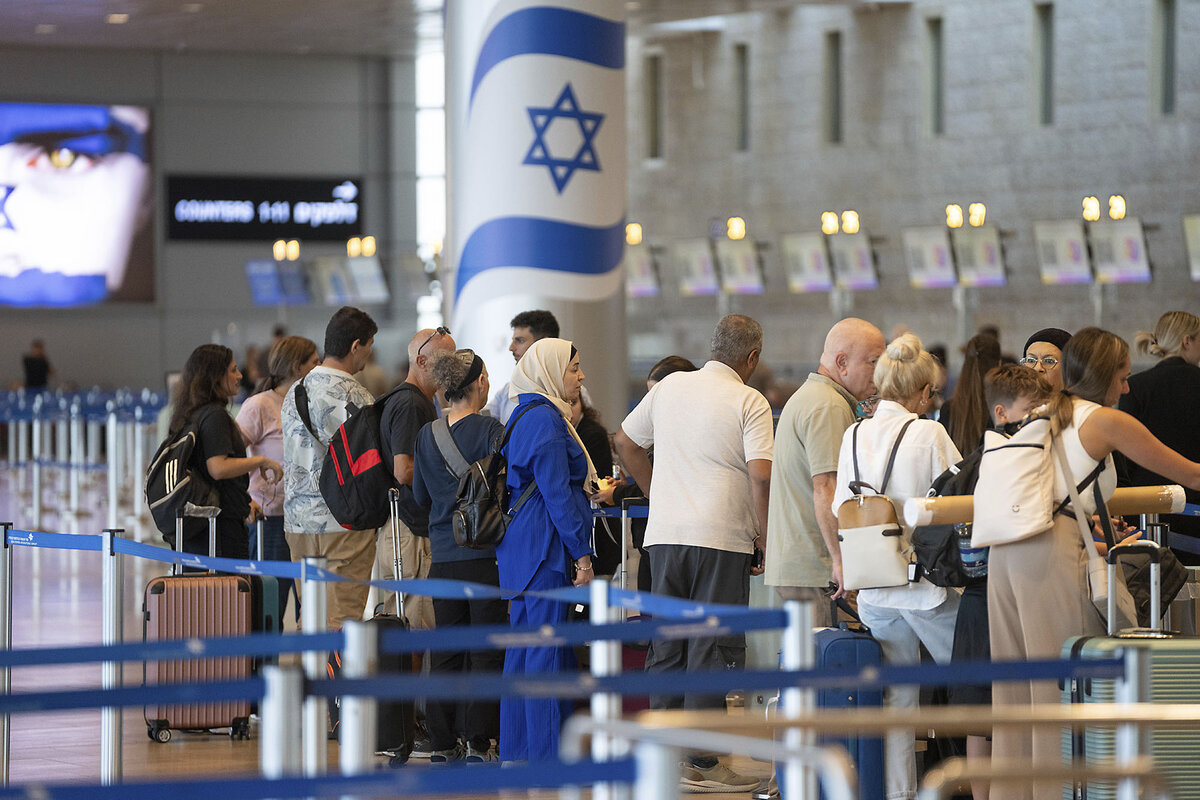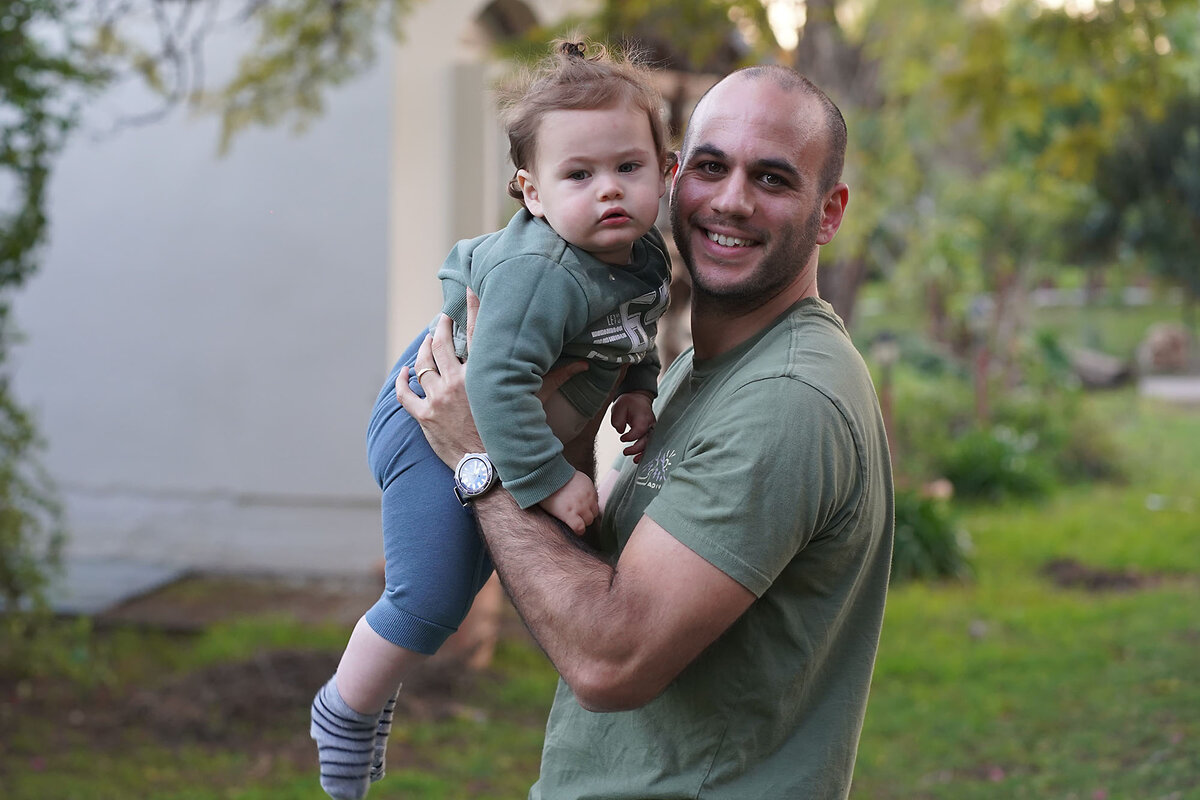Israel’s economy, wounded by war, is healing. Why the public remains sour.
Loading...
| Tel Aviv, Israel
Kindergarten teacher Merav Weiss surveys spring-color clothing as she and her daughter walk around a newly opened mall on the outskirts of Tel Aviv. She says she hasn’t bought anything yet.
“I am more careful about my spending” as everything has become “so expensive,” she says. Because of the war and the neglect of Israel’s distracted political leadership, things are “very difficult,” she explains. “People are suffering.”
Walking around the same open-air mall with a friend, Sharon, a real estate agent who gives only her first name, says she, too, is “not optimistic” about the economy. Interest rates are high, and there is “stagnation” in the construction sector because of a lack of Palestinian workers since the war started.
Why We Wrote This
A story focused onAfter 18 months of war, uncertainty and contradictions are everywhere in Israel. The economy shows signs of recovery, but citizens lack confidence. One reason: The government has failed to spell out a clear vision for the future.
“Young couples can’t afford apartments, and rents are going up,” she says.
After 18 months of the Israel-Hamas war, uncertainty and contradictions are everywhere. The ceasefire in Gaza has collapsed, yet efforts continue to bring the remaining hostages home and achieve a more durable truce.
Israelis work, go out, and attend concerts one day, then, wrapped in flags, tearfully line the streets to accompany slain hostages to their graves the next. The economy shows modest signs of recovery, but citizens focus on the negative.
Nadine Trajtenberg, a former deputy governor of the Bank of Israel, says the economy is not doing that badly considering the physical and mental battering the war has wrought. Booming in the years before Hamas’ Oct. 7, 2023, attack, the economy grew 1% in 2024, exceeding forecasts. Unemployment is low, the high-tech sector seems to be thriving, and the shekel has weathered the storm surprisingly well.
Lack of political vision
Yet a majority of Israelis voice pessimism about the economy, according to a March 9 survey published by the Israel Democracy Institute. That was even before the tariffs on Israel announced by U.S. President Donald Trump, which present yet another challenge to Prime Minister Benjamin Netanyahu, under pressure for his handling of the war, alleged corruption, as well as the economy.
In the poll, 72.5% of respondents favored Mr. Netanyahu resigning from his post either now or after the war. He was meeting Monday with President Trump at the White House to discuss the tariffs and the war, both of which cast a deep shadow over the direction of the economy.
Several factors contribute to the malaise felt by Israelis about the economy: Taxes have risen to pay for the war; the Houthis’ Red Sea blockade has made imports costlier; airfares have surged as airlines have canceled or curbed flights to the country; tourism has plunged; and many reserve duty soldiers have returned to their small businesses to find them debilitated by their prolonged absence. Other reservists have even lost their jobs.
As salaries have remained stagnant through all this, the quality of life for Israelis has dropped, explains Ms. Trajtenberg. Not only that: The hard-right government has failed to spell out a clear vision for the economy, which could raise hopes and lead to a quicker recovery, she adds.
“The biggest problem … is that we don’t know where we’re going,” she says. People are willing to put up with hardship if they know things are going to get better, but “there’s no strong signal it will get better.”
The government budget, just passed, “does not really give us a sense of direction,” Ms. Trajtenberg says. “We need to know what’s more important and what’s less important. And none of this is really happening.”
The need for additional spending on defense in coming years, meanwhile, “will lead to higher taxes or a reduction in services, and probably a combination of both.”
The collapse of construction
In the immediate aftermath of the war Israel’s economy froze. Some 350,000 reservists, or 20% of the nation’s workforce, were mobilized at some point. Residents were displaced from front-line communities; rocket-barraged businesses and farmlands shut down.
Overnight, Israel halted the entry of over 130,000 Palestinian workers from the West Bank and Gaza, the majority of whom were employed in construction. Israeli contractors were forced to shut down sites and scramble for labor.
Nir Yanushevsky, who managed a Tel Aviv-area construction firm with 1,000 workers, most of them Palestinians, says laborers “disappeared overnight” with the start of the war.
“The government’s efforts to bring in workers from India and other countries have been hampered by bureaucracy,” he says. His firm now employs 80 workers from India and is planning to bring in 40 more from Thailand. But “the costs of employing these new workers are double those of Palestinians,” he says.
Along with the high interest rates, the situation is deterring contractors from starting new projects, exacerbating a housing shortage. According to Bank of Israel data, home prices rose 7.3% in 2024.
All eyes on tech
All eyes are thus turning to the nation’s tech sector, which has helped the country bounce back from previous crises.
The sector generates 20% of Israel’s gross domestic product, accounts for over half of the country’s annual exports, and employs 12% of Israel’s workforce. The industry helped Israel rebound from a 1.5% contraction in 2020 – amid the COVID-19 pandemic – to 9.9% in real GDP growth in 2021, S&P data shows.
At the beginning of the war, some 10% to 15% of the tech workforce was called to reserve duty. But soon after the initial shock, CEOs and employees leaped into action to make sure they kept their firms’ commitments.
Employees took on added work to cover for those at war; some temporarily relocated abroad to meet deadlines. CEOs pivoted between their startups and the battlefield, hastily taking off army uniforms to jump onto investor calls.
The efforts proved fruitful. In 2024, Israeli tech firms raised almost $11 billion from private investors, a 28% increase from 2023, according to Startup Nation Central (SNC), a nonprofit that supports the industry.
Some foreign investors shied away because of risk and practical difficulties, such as the inability to travel to Israel, says Avi Hasson, CEO of SNC. But others “doubled down on Israel,” compensating for those who stayed away.
On Nov. 9, 2023, Carrar, a maker of battery systems for electric cars, was scheduled to demonstrate the safety of its products to Sweden’s Volvo Group.
Yet on Oct. 7, one of Carrar’s key engineers, Tom Balestra, was hiding under his bed with his pregnant wife on Kibbutz Nir Am during the Hamas attack. Rocket debris damaged Carrar’s offices, located just two miles from the Gaza border, making the premises unsafe. Eight of the firm’s 25 employees, all engineers, were called to reserve duty.
“We had to be flexible in the way we managed the team,” says CEO Avinoam Rubinstain. Some employees worked from home or at a quickly organized space in Tel Aviv. Others worked under rocket fire at the company labs.
Mr. Balestra traveled with a small team to Germany to test the product – three days before his son was born – and the firm managed to present the findings to Volvo in Sweden on time in November, says Mr. Rubinstain.
The CEO, a 25-year tech veteran, says Carrar raised $5.3 million from investors in 2024 despite the war, but the process “took longer and more effort.” Now, he says, things are almost normal: Conversations with customers and investors are about business and global developments, and less about war.
Focus is international
Indeed, Israeli tech is more impacted by jitters about a global trade war and a U.S. recession than by local geopolitics, says the SNC’s Mr. Hasson.
Although the war in Gaza has been a longer and more significant event than previous crises, he adds, tech has again demonstrated its resilience.
On March 18, even as fighting resumed in Gaza, Google announced an agreement to acquire Wiz, a cybersecurity company founded in Tel Aviv five years ago by four Israeli military veterans. The cash deal is for $32 billion, the most for an Israeli tech firm in history.
The total value of tech mergers and acquisitions in 2024 reached almost $16 billion, a 49% increase over 2023, SNC data shows.
The Bank of Israel said Monday that Israel’s economy will grow by 3.5% this year and 4.0% in 2026, lower than its previous forecast, amid the high levels of uncertainty cast by the new tariffs imposed by the U.S. and developments in the war.
Yet any further economic recovery, if and when it happens, will be too late for Mr. Yanushevsky, the contractor, who has moved his family to New Jersey, where he manages the real estate investment activities of the family business.
There is “little hope for a good future in Israel,” he says. “The government is dysfunctional and unprofessional. There is no strategy.”
Even though his “heart is still in Israel,” he says, his family is happy in the United States. “It is quiet here. The only explosions you hear are fireworks.”









